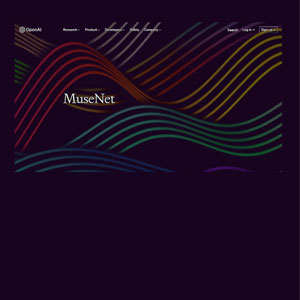The AI music generator MuseNet from OpenAI runs on deep neural network technology which creates novel music covering multiple styles and genre types. The predictive technology used by GPT-2 powers MuseNet to anticipate musical sequences which allows it to generate harmonized compositions.
Through its platform users can combine multiple musical instruments to produce tracks made from Mozart and Beethoven’s classical repertoire in addition to songs which emulate The Beatles pop sound. This versatility enables users to create exciting innovative sound effects and multi-genre compositions. The system presently restricts itself to creating four-minute musical tracks but it works best when producing short pieces like jingles and intro sequences.
Users can explore fresh music ideas through this software without any expense since it operates as a free service. The SaaS-based platform delivers instant browser-based access so users experience flexible use across multiple platforms.
Its proficiency with multiple musical contexts allows the software to generate rich musical arrangements. It lets users create distinctive music output by combining different musical styles. Despite its capabilities MuseNet imposes two main limitations through its maximum composition duration of four minutes and its failure to handle unexpected musical pairings effectively. Even with its known weaknesses it serves users well who want to explore musical ideas without financial cost.
MuseNet functions as an outstanding free instrument which enables users to investigate various musical creative possibilities while generating cross-genre musical compsitions. Due to its restricted composition duration the application becomes less beneficial for extensive musical creations. Music beginners or budget-conscious producers can benefit from MuseNet’s operational value for creating original pieces.
🍪 Do you like Cookies?
We use cookies to ensure you get the best experience on our website. Read more...








